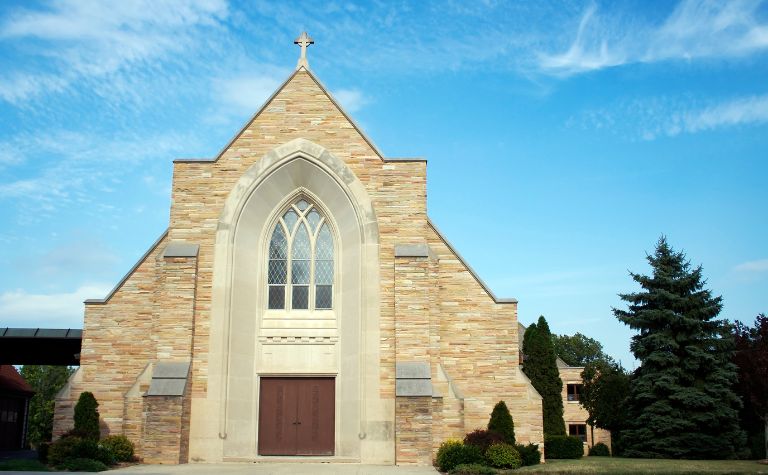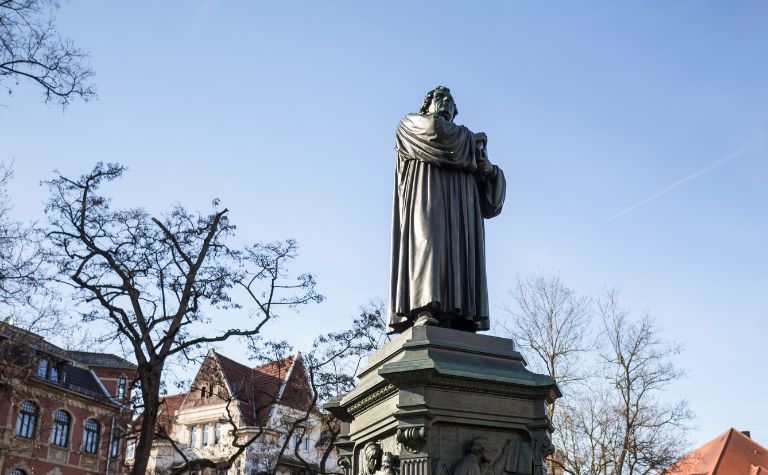Salvation is one of the essential doctrines in the Lutheran tradition. According to Lutheran teaching, Jesus Christ died on the cross to save people from sin (1 John 2:2). This leads some people to wonder if someone could lose their salvation in Christ.
Lutheranism teaches that the elect can fall from grace and lose their salvation. But God’s grace can restore the fallen. According to Lutheran theology, two examples are David and Peter, who committed egregious sins, but God extended His grace to them.
What is the difference between a saved person who still sins and a person who sins in a manner that reveals that they aren’t saved anymore? Can anyone genuinely have an assurance of their salvation in Lutheranism? Keep reading to learn more.
Also see Lutheranism vs. Roman Catholicism: Differences to learn more.

Do Lutherans Believe In Once Saved Always Saved?
Lutherans don’t believe in “once saved, always saved” when people use the term to describe someone who feels so secure in their salvation that, no matter how much they sin in life, they are guaranteed to go to heaven when they die.
One theologian represents the classic, orthodox Lutheran teaching when he explains, “Scripture teaches that God’s elect saints will not be lost, but obtain everlasting salvation (Mt 24:22–24; Ro 8:28–39; 1 Co 1:8–9; 10:13).”
He continues, “This does not mean that the elect saints cannot fall from grace and so temporarily lose their faith (David; Peter); but it does mean that God’s saving grace, without any merit on their part, will restore them to the state of faith, so that in Christ they finally die a blessed death.” [1]
The phrase “once saved, always saved” is often associated with Calvinism and Reformed theology, though people use it to describe beliefs found in other Protestant traditions. (For example, some Baptists have Calvinistic theological beliefs.) (Also see Lutheran vs. Baptists: What’s the Difference?)
Some Calvinist theologians and pastors don’t like the phrase “once saved, always saved” because it doesn’t accurately reflect the totality of their beliefs on the topic of salvation.
Can the elect continue to sin? “Once saved, always saved” suggests to some that a person can behave any way they want if they are elected. No matter what they do, their salvation is secure, so they can sin as much as they want.
Calvinism doesn’t teach that. If a person uses their supposed security as a saved person to willfully continue in sin, that is a sign that God hasn’t saved them. Genuinely saved people combat sin in their life and pursue holiness. (Also see Do Lutherans Believe You Can Lose Your Salvation?)
Something many people wonder about Christianity is Do All Denominations Go to Heaven? Follow the link to learn the answer to this critical question.
Is Assurance of Salvation Possible?
Lutheranism teaches that a person can have an assurance of their salvation. The reality of assurance offers comfort to God’s children, who, in weakness, sometimes doubt that God has saved them. (Also see Are Lutherans Born Again?)
It also glorifies God’s grace in Christ through whom salvation is possible. The characteristics of saved people are:
- A genuine love for God.
- A passionate hatred of sin.
- Loving and forgiving others.
- Pursuing holy and righteous living.
“The testimony about Christ was confirmed among you — so that you are not lacking in any gift, as you wait for the revealing of our Lord Jesus Christ, who will sustain you to the end, guiltless in the day of our Lord Jesus Christ. God is faithful, by whom you were called into the fellowship of his Son, Jesus Christ our Lord.” 1 Corinthians 1:6b-9 (ESV, emphasis added)

What Does Perseverance of the Saints Mean?
The term “perseverance of the saints” is the traditional name of the doctrine that describes God sustaining a believer’s salvation. (Also see Lutheran vs. Non-Denominational: What’s the Difference?)
All Protestant traditions agree that not everyone who says they are saved will be saved, but only those whose faith is genuine.
According to the New Testament, God’s power, through people’s faith, sustains their salvation: “Blessed be the God and Father of our Lord Jesus Christ! According to his great mercy, he has caused us to be born again to a living hope through the resurrection of Jesus Christ from the dead, to an inheritance that is imperishable, undefiled, and unfading, kept in heaven for you, who by God’s power are being guarded through faith for a salvation ready to be revealed in the last time.” 1 Peter 1:3-5 (ESV, emphasis added)
Martin Luther vs. John Calvin On the Perseverance of the Saints
Lutheranism and Calvinism are two Protestant Christian traditions with much in common. Their views on the perseverance of the saints, however, have differences.
One theologian describes the Lutheran view this way: “For Lutherans, the elect will certainly persevere in faith… but not everyone who is born again is among God’s elect. It is possible for regenerated people to apostatize.” [2]
| Luther | Calvin |
|---|---|
| Perseverance is based on God’s election | Perseverance is based on God’s election |
| A Christians can be assured of their salvation; they have more certainty than in Lutheranism | Christians can be assured of their salvation; they have more certainty than in Lutheranism |
| The Holy Spirit’s work of regeneration can be undone | The Holy Spirit’s work of regeneration cannot be undone |
| Pastors must encourage people to make their calling and election sure (2 Peter 1:10) | Pastors must encourage people to make their calling and election sure (2 Peter 1:10) |

Lutheran Teaching on the Perseverance of the Saints
What is an example of Luther’s teaching on the perseverance of the saints? Luther believed that the Holy Spirit departed from a regenerated person because of sin. The example he gave is David.
Luther’s emphasis was on the public nature of his offense: “It is necessary to know and teach that when holy people—aside from the fact that they still have and feel original sin and also daily repent of it and struggle against it—somehow fall into a public sin (such as David, who fell into adultery, murder, and blasphemy against god), at that point faith and the Spirit have departed.” Martin Luther, Smalcald Articles (1537), 3.3
What is an example of a Lutheran theologian’s teaching on the perseverance of the saints? Lutheran theologian David Hollaz, like Luther, taught that a regenerate person could lose their salvation:
“The grace of regeneration is lost when sins subversive of conscience are deliberately committed (1 Tim. 1:19). But regeneration lost may be recovered by the penitent (Gal. 4:19).”
He continues, “Men regenerate, aided by the preserving grace of God, should be carefully on their guard, lest, by the malicious repetition of sin, they do injury to conscience; but if, nevertheless, they are overcome by the machinations of the devil, the enticements of the world, and the suggestions of the flesh, and fall three or four times, or oftener, into mortal sin, they need not at all doubt of the converting and regenerating grace of God.” David Hollaz, Lutheran theologian
References:
[1] Source
[2] Source
[3] Source
[4] Source
Related Articles
Catholic vs. Protestant vs. Orthodox: What's the Difference?
Roman Catholicism, Protestant Christianity, and the Eastern Orthodox Church are the three historical branches of the Christian religion. Each tradition traces its doctrines and practices to the New...
The belief that God chooses some people for salvation and not others has caused vigorous debate throughout Christian history. The topic involves many theological issues, such as free will and the...
